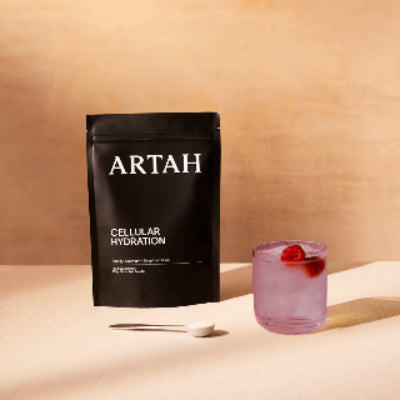NAD is an abundant, naturally occurring co-enzyme in the body that’s involved in everything from cellular energy production and metabolism to immune regulation and cellular repair. It naturally declines with age, and whilst this is a normal and expected process, it can have numerous effects on how well we feel, how well we function, and how well we live. Enter NAD optimisation; whether it be indirectly through dietary tools (like IF), exercise methods (like HIIT) stress reduction (like breathwork), or direct methods (like NR supplementation), there are various levers we can pull to help boost NAD. What type of impact can this have? Here are 3 studied benefits of NAD.
Energy
Energy is created by little components of our cells called mitochondria; think of them as the powerhouse of our cells, and having healthy mitochondria, with enough NAD, is essential for their ability to create energy. When we think of energy, we usually think of the actual physical energy we feel throughout the day, but energy creation on a cellular level impacts a variety of biological processes, many of which we don’t feel. For example, in addition to having high levels of mitochondria in our muscles, our liver, brain, heart, and reproductive system (sperm and eggs) are densely populated with mitochondria because of their high energy requirements. (1) This is one of the reasons why restoring NAD levels can be so impactful, not only to our physical and cognitive energy, but also to energy on a cellular level. Supplementation of NR, the precursor to NAD, has been shown to increase NAD levels and subsequently enhance energy production, and Niacin, which also feeds into the NAD pathway, reduces tiredness and fatigue. (2)
Brain Health
Even though our brain accounts for just 2% of our total bodyweight, it uses roughly 20% of our body’s energy. (3) With such a demanding energy requirement, it’s easy to understand why dysfunctional mitochondria, and a subsequent lack of ATP, means less energy for everyday activities of the brain – including simple things like focus, memory, and the ability to manage emotional pressure. Changes in NAD and mitochondrial function are also associated with age-related changes in cognitive function and neurodegeneration. (2,4)
Exercise Performance
During exercise, our muscles have a prolonged requirement for energy, so ensuring that we can create it at pace with adequate levels of NAD is important. Small studies have shown that NR supplementation increased NAD levels and peak muscle strength, and reduced fatigue during exercise in older individuals. (5) But energy metabolism isn’t just about having NAD present, it also relies on the activation of certain pathways in order to make fuel available for energy production; these master regulators, which include AMPK and sirtuins, essentially redirect cellular metabolism towards energy production, and away from energy storage. For example, by enhancing glucose transport into cells, and increasing fatty acid oxidation for energy.
3 Natural Ways to Boost NAD
Food Sources: Increase foods with Vitamin B3, or Niacin, including beef, poultry, fish brown rice, nuts, seeds, legumes, banana, avocado, and broccoli. The amino acid Tryptophan is another precursor that feeds into the NAD synthesis pathway, which can be found in salmon, poultry, eggs, spinach, seeds, edamame, nuts, quinoa, oats and buckwheat.
NR Supplementation: NR, or Nicotinamide Riboside, which is found in Enhanced NAD+ Complex, alongside Niacin and other NAD boosters, like Panax Ginseng, Quercetin, and Apigenin.
Stress Reduction: Whilst this doesn’t directly boost cellular NAD, chronic stress has been shown to deplete NAD, making it an important consideration which will, of course, benefit every other aspect of physical and emotional wellbeing as well.
Disclaimer: The information presented in this article is for educational purposes only and is not intended to diagnose, prevent, or treat any medical or psychological conditions. The information is not intended as medical advice, nor should it replace the advice from a doctor or qualified healthcare professional. Please do not stop, adjust, or modify your dose of any prescribed medications without the direct supervision of your healthcare practitioner.
References:
- Alberts B, Johnson A, Lewis J, et al. Molecular Biology of the Cell. 4th edition. New York: Garland Science; 2002.
- Amjad S, Nisar S, Bhat AA, Shah AR, Frenneaux MP, Fakhro K, Haris M, Reddy R, Patay Z, Baur J, Bagga P. Role of NAD+in regulating cellular and metabolic signaling pathways. Mol Metab. 2021 Jul;49:101195. doi: 10.1016/j.molmet.2021.101195. Epub 2021 Feb 17. PMID: 33609766; PMCID: PMC7973386.
- Kwon, Diana. Could Mitochondria Be the Key to a Healthy Brain? Scientific American. June 18, 2021
- Rajman L, Chwalek K, Sinclair DA. Therapeutic Potential of NAD-Boosting Molecules: The In Vivo Evidence. Cell Metab. 2018 Mar 6;27(3):529-547. doi: 10.1016/j.cmet.2018.02.011. PMID: 29514064; PMCID: PMC6342515.
- Dolopikou, C.F., Kourtzidis, I.A., Margaritelis, N.V. et al.Acute nicotinamide riboside supplementation improves redox homeostasis and exercise performance in old individuals: a double-blind cross-over study. Eur J Nutr59, 505–515 (2020). https://doi.org/10.1007/s00394-019-01919-4



















































